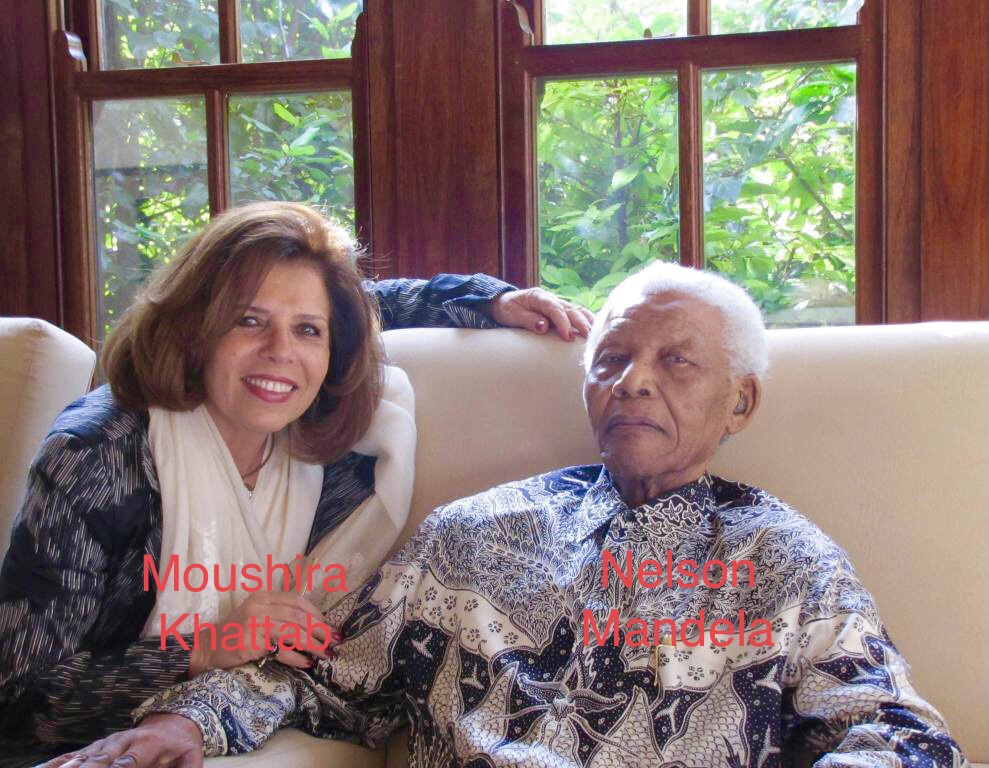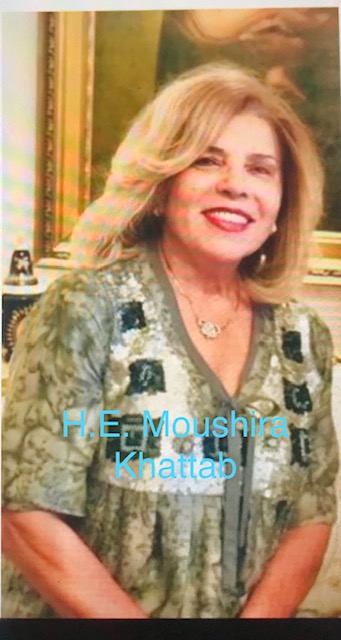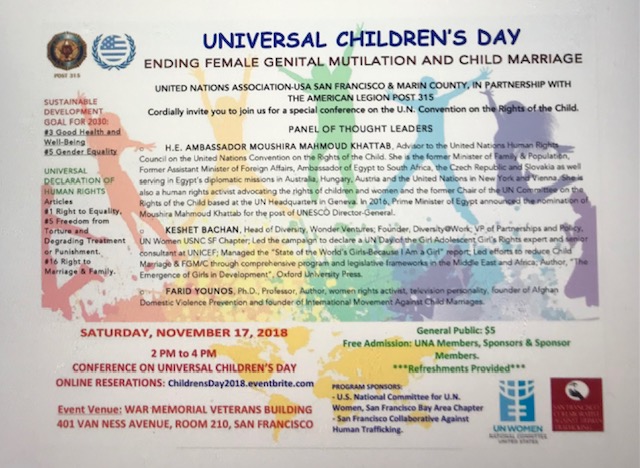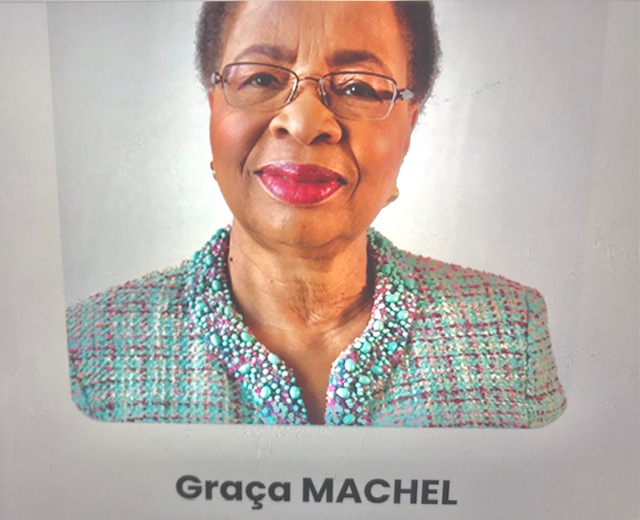
Her Excellency Moushira Khattab, an Egyptian and global human rights leader, gets the attention of more than one million watchers worldwide through “What’s your Right?” a San Francisco TV program. What she does to defend human rights is educate people to be aware what their rights are, first of all.
H.E. Moushira Khattab was honored in San Francisco at the War Memorial Veterans Building, (the site of the 1965 signing of the U.N. Charter), for “The Universal Children’s Day”, an event in San Francisco organized by Hon. Mary Steiner, focused on ending female genital mutilation and child marriage.
Khattab is the first leader in the world to have written a law against FGM (Female Genital Mutilation). This law took effect in Egypt and Khattab supports extending it to rest of the African continent. But this horrible practice, rooted in tradition rather than religion, is still practiced in other continents and even in the USA!
One of Khattab’s mottos is: “give people the educational means so that they are aware of and defend their rights.”
Here is my interview with Her Excellency Moushira Khattab:
Wardal: Your Excellency Moushira Khattab, what are the best strategies that each country should take to raise awareness of human rights?
Khattab: Thank you, Count, for asking me about human rights. Educating the people is the priority in raising awareness of human rights.
To educate all the people, with special care towards the most vulnerable and the poor, is the duty of each state which is legally committed to protect human rights without any discrimination. This includes educating people about the right to equally dignified treatment without any discrimination among rich and poor, males and females, Christians, Jews, Muslims, believers in any other religion, atheists, able-bodied, able-minded or disabled people, different races or sexual or gender orientations. In order to make people aware of their rights, empowering people is not a favor but a duty, a legal obligation for nations.

Wardal: Many planned human rights initiatives and institutions remain inactive and often disband when there is a change of head of state. How can we avoid such tragic suspension or even cancellation of such activities? How to make action to promote human rights independent of the changing winds of politics?
Khattab: Thank you very much for this further important question. I repeat, the people are the strongest pillar of any state. When the people are educated about the rights, they will fight for their rights. When people know their rights they do not fall into oppression by the rich and powerful.
The civil society organizations are very close to the people in Egypt. I am so proud to have coordinated, initiated and led many movements to defend women and children against FGM, child marriages, human trafficking, and all forms of violence against children. We have seen two revolutions in Egypt: the 2011 Arab Spring and the more recent June 30 revolution. And thank God, the law that I have engineered about Female Genital Mutilation (FGM) is still intact. It is the pride of Egyptian society because it was drafted by the people .
I spent five years educating the people, parliamentarians, the judiciary, and legislators about FGM and the rights of our children, and I talked about that issue globally as well. One of the first actions that the Muslim Brotherhood took in 2012 was to try to revoke the FGM law, but the people defended it and the civil society organizations defended it. They said, ‘This is our law, we made this law’ and now this law is intact and thank God, children have more rights, women have more rights, because people know about the their rights. Political leaders – the head of the state, the judiciary, legislators, executive branch leaders, must be committed to the rights of the people, but the strongest link of this chain is the people themselves.
Wardal: Your Excellency is the first vice chairman of the African Committee of Experts on the Rights and Welfare of the Child and you are a member of the International Board of Trustees of the African Child Policy Forum. The president is H.E. Graça Machel, widow of Nelson Mandela. She is an icon. What are the national and international programs led by these organizations?

Khattab: I am happy to be part of these organizations. The Rights of African Children is a committee established by the African Charter of the Rights and Welfare of the Child, which is composed of experts with the purpose of assisting member states to fulfill their commitments to the rights of their children. States present periodical reports to the committee and the committee reviews the reports and makes recommendations to delegations of states and to civil society in order to help them advance the rights of children.
The committee looks to see if the states have solid laws that guarantee the rights of children, if the states have a national plan of action, if the states have allocated sufficient financial funds and human resources towards the implementation of plans enhancing children’s rights. They check to see if the government is working in partnership with civil society groups to make people aware of the rights of the child and if children themselves are aware of their rights.
The committee makes recommendations to the delegation of states and civil society representatives on how to improve the conditions of children and enforce their rights in cooperation with the African Union and the United Nations. The committee of experts is selected by the nation’s representatives to the African Union. The African Child Policy Forum is a very solid civil society organization that works for the rights of African children through providing knowledge and dialogue and advocacy for improvement.
The African Policy Forum works to make sure that African governments are continually fulfilling their child rights obligations and legal responsibilities and putting in place policies and legal protection for the wellbeing of all children. These include vulnerable children, poor children, children separated from their families, refugee children, internally displaced children due to armed conflicts. Issues of concern to us include child and human trafficking, child soldiers, child marriage, and child labor.

Wardal: Excellency, climate change is making it increasingly harder to sustain life on our planet. We are all weaker and it is more difficult to control the proliferation of viruses and epidemics.
Khattab: Thank you for this connection you made between climate change and Covid!
The economies and societies of most countries, rich or poor, are set up to function under normal conditions. So when special and emergency conditions such as Covid occur, these systems collapse into chaos, resulting in health and economic catastrophes. Climate change, demographic explosions and wide-ranging damage from conflicts are not taken into account. Political will is insufficient to address this crisis, where peace and security need to be strongly promoted. We need the political will to enable the UN to deal with such a crisis. The UN’ s member states need to review its charter to enable the security counsel to meet its responsibilities. When COVID 19 erupted, Secretary General Antonio Guterres spoke up on March 23, 2020 and invited world leaders to put their guns down and fight Covid-19. A strong food program was successfully implemented to face the COVID emergency during the state of chaos in which humanity had fallen.

Wardal: The Nobel Prize-winning genius Marconi, inventor of the radio and telegraph, said, ‘My inventions are for the benefit of humanity and not to be used for its destruction.” On the other hand, there is no such control on the scientific research on viruses.
Khattab: We need international transparency and information sharing in the age of Covid. No nation should hold onto medical information, but should share it instead to protect human beings from falling sick.
This should also apply to the Covid vaccines. Poor people have the right to be protected from the virus as well. The UN has to deal with the distribution of the vaccine and is making decisions right now on who gets the vaccines first and how to make them available to those who cannot pay.
International transparency on this aspect is absolutely necessary in order not to lose further human lives.
Wardal: Excellency, you are always welcome as a guest on my San Francisco television show! I also encourage you to write a book about your immense knowledge of civil and human rights. I know you are busy with vital political activity, but maybe, step by step, you could start to write a book, chapter by chapter. I would be especially happy helping you.
Khattab: Thanks. My children and my friends constantly encourage me to write a book about my long and continuing work to improve living conditions and to guarantee respect, equality, and dignity. I will see. At the moment my life doesn’t leave me this possibility.
